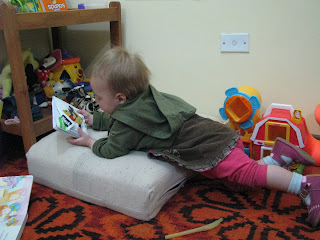There is a lot of fighting between the Peruvian govt/military and the Amazonian natives. The natives feel the government is exploiting and violating their rights over certain land ownership, especially land that has a certain important significance to the people. However, the government usually do what they want in situations like this. The natives organized a protest (which happen all over Peru for various reasons several times every year). The natives became relatively violent in their protests, and it is unknown to us who started the violence first, but the government entered with guns by force rather than continuing to engage in peace talks. Many people on both sides have been killed.

In Cusco, there have been large protests. These have been relatively peaceful. The walls of the buildings in the central plaza of Cusco are plastered with posters stating the peoples upset with government, some are serious, some hateful, some funny. In Cusco, the people are "taking" the airport and other means of transportation, which means flights may be canceled. One flight in a city close by here was not able to land because the people managed to get onto the runway. 10,000 protesters have marched in Lima, with several hundred more here in Cusco and in other cities.
The government has closed down the Bangua radio station, called La Voz (The Voice). It is a main form of communication among the people. The Govt feels it to be a threat, although there is no legal reasons for closing it down. "This is the only radio station that has transmitted live coverage of the Bagua conflict, providing a voice through its microphones to the people of Bagua." (http://www.livinginperu.com/news-9328-breaking-news-perus-ministry-of-communications-closes-bagua-radio-station)
We are praying for the situation in the Amazon to be resolved quickly and without further bloodshed.
Here is an excerpt from an email from some friends of ours who are missionaries in Peru, in Tarapoto, a part of the Amazon. It explains a little more first hand of what is going on.
A couple of weeks ago, if we had taken our 17 hour trip through the jungle, over the mountains and down the coast to Trujillo we would have been stuck there and unable to make it back to Tarapoto. The highway opened up for only a few days and then was once again taken over by natives who still refuse to let anyone through until the government promises to stop exploiting them and their lands. As a result our city continues to be cut off from all transportation, commerce and gasoline. The city's electrical grid is run by gasoline generators which will no longer be able to function by midnight tonight for lack of combustible. The city has been rationing power the last ten nights cutting streetlights and starting tonight it'll be no electricity at all! (This might be our last e-mail for a while).
Today everyone is listening for news as much violence has broken out at the roadblock (Bagua Grande – halfway between here and the coast). The government has sent in hundreds of police armed with machine guns to take on thousands of natives armed with blow guns, spears and bows and arrows. Today a helicopter has been downed and the natives have killed several police but of course the police and army have taken out many more of the natives with their modern weapons. In Yurimaguas, the natives are outraged at the news of the killing and are preparing ambushes from the jungle around the highway and we've heard they are planning to blow up gas stations if and when the police attempt to get close.
**We have just heard that there is now NO gas in the gas stations!!**
Please pray with us that they can come to a peaceful solution soon.
PS. When we say `natives', we do not use the term insensitively as, we as the American missionaries are the civilized and the Peruvians are the uncivilized! The term `natives' is a term the Peruvians themselves use for this people group, who are living as their ancestors have historically lived in their villages and/or nomadically living off the land. This is in contrast to the approximate other half of Peruvians who are part of a mestizo group who are of mixed Spanish and native Peruvian descent.







